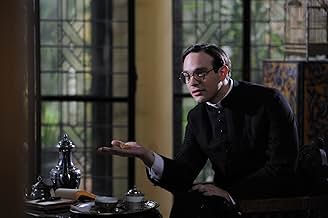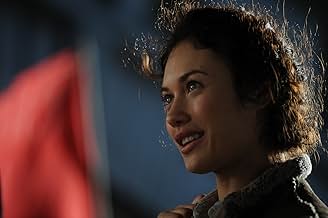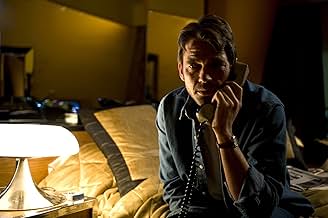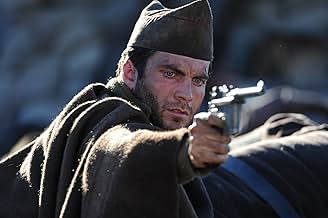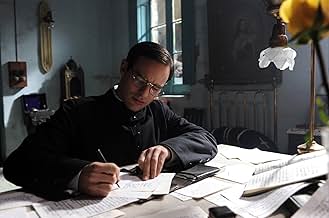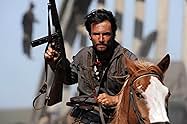IMDb रेटिंग
5.7/10
5.2 हज़ार
आपकी रेटिंग
अपनी भाषा में प्लॉट जोड़ेंArising out of the horror of the Spanish Civil War, a candidate for canonization is investigated by a journalist who discovers his own estranged father had a deep, dark and devastating conne... सभी पढ़ेंArising out of the horror of the Spanish Civil War, a candidate for canonization is investigated by a journalist who discovers his own estranged father had a deep, dark and devastating connection to the saint's life.Arising out of the horror of the Spanish Civil War, a candidate for canonization is investigated by a journalist who discovers his own estranged father had a deep, dark and devastating connection to the saint's life.
- पुरस्कार
- 2 कुल नामांकन
Jordi Mollà
- Don José
- (as Jordi Mollá)
Juan Cruz Rolla Knight
- Young Josemaría
- (as Juan Cruz)
फ़ीचर्ड समीक्षाएं
I found this film so pretentious in its aspiration and claims, so boring badly-acted and obviously propagandist in its execution to compel me to write my first review. (When I woke up after the big ZZzzz, I mean...) What it does is to paint a glorified history of the "Saint" and the birth of the Opus Dei, in pure ecclesiastic style, never mind historic accuracy.
It would still be all OK to me if the film had any cinematographic merits, if the acting was good, if dialogue was credible But it really isn't (e.g., "I wasn't allowed to play with Jose Maria anymore, my father thought poverty was contagious... My dad had more money, ... but Jose Maria had more dad." Excuse me! And also: "Like or not, most young men were celibate, at least as a priest you got paid for it". What? Excuse me!)
So, my advice is: really don't waste your two hours trying to stay awake during this: if you're interested in the Opus Dei and Escriva De Balaguer, find a more serious and reliable source, if you only want to go the movies, find a better film. This one should stay in the religious circles were it belongs, not in theatres.
It would still be all OK to me if the film had any cinematographic merits, if the acting was good, if dialogue was credible But it really isn't (e.g., "I wasn't allowed to play with Jose Maria anymore, my father thought poverty was contagious... My dad had more money, ... but Jose Maria had more dad." Excuse me! And also: "Like or not, most young men were celibate, at least as a priest you got paid for it". What? Excuse me!)
So, my advice is: really don't waste your two hours trying to stay awake during this: if you're interested in the Opus Dei and Escriva De Balaguer, find a more serious and reliable source, if you only want to go the movies, find a better film. This one should stay in the religious circles were it belongs, not in theatres.
The problem with this film at IMDb is to know the real and final score. Right now is eight (8). 119 users of 147 voted ten (10), 14 voted nine (9), 6 voted eight (8). The others users voted lower than six (6). Well, or this is a spectacular film or we have a problem here. This score seems to me a little unreal and unbelievably.
Knowing Opus Dei since 1980, I think these 119 users are probably Opus Dei voters only and want to keep the score so higher as possible.
Why does this matter? Because a score should be representative and product of neutral or spontaneous voting. Well, I can barely believe this is the case. Let's see what happen in the next months.
And what about the film? Well, if somebody wants to know about Escriva and his Opus Dei, this film does not tell too much.
This is a very light film without any real information and questions like: How Opus Dei as organization was actually built since 1928? Why Opus Dei is in a very deep internal crisis since ten or fifteen years ago? Why a lot of people are leaving Opus Dei in the last years (in Spain, Mexico, Argentina, etc.)? Why is not so easy to leave Opus Dei? Yes, it is not easy but a lot of people fight for. Is it true that Escrivá declared whoever leaves Opus Dei will suffer a lot in this life and his eternal salvation will be in danger? Why so many celibate members suffer from depression? Is it possible that Opus Dei psychiatrists do not keep the professional secrecy and inform to Opus Dei superiors if a member talks about leaving Opus Dei? Yeah, that is a tough question to be made. How is possible that Escrivá became saint mainly because the testimony of his confessor? Why celibate members have to make a will (pro Opus Dei) like monks do before the perpetual incorporation? Why celibate members have to give their salary away like some monks do? Why lay members have to request a pardon of departure (dispense) to leave Opus Dei (like monks do) only need in the case of sacred vows? Is that because without knowing they really are bounded by some kind of sacred vows? Why lay persons have obligations - without knowing and without consent- that the Code of Canon Law established only for a consecrated life? Is there any kind of deception in all of this?
After these questions, you know a serious film about Opus Dei and Escrivá is waiting to be made.
I am not going to vote. I rather write this brief review.
Knowing Opus Dei since 1980, I think these 119 users are probably Opus Dei voters only and want to keep the score so higher as possible.
Why does this matter? Because a score should be representative and product of neutral or spontaneous voting. Well, I can barely believe this is the case. Let's see what happen in the next months.
And what about the film? Well, if somebody wants to know about Escriva and his Opus Dei, this film does not tell too much.
This is a very light film without any real information and questions like: How Opus Dei as organization was actually built since 1928? Why Opus Dei is in a very deep internal crisis since ten or fifteen years ago? Why a lot of people are leaving Opus Dei in the last years (in Spain, Mexico, Argentina, etc.)? Why is not so easy to leave Opus Dei? Yes, it is not easy but a lot of people fight for. Is it true that Escrivá declared whoever leaves Opus Dei will suffer a lot in this life and his eternal salvation will be in danger? Why so many celibate members suffer from depression? Is it possible that Opus Dei psychiatrists do not keep the professional secrecy and inform to Opus Dei superiors if a member talks about leaving Opus Dei? Yeah, that is a tough question to be made. How is possible that Escrivá became saint mainly because the testimony of his confessor? Why celibate members have to make a will (pro Opus Dei) like monks do before the perpetual incorporation? Why celibate members have to give their salary away like some monks do? Why lay members have to request a pardon of departure (dispense) to leave Opus Dei (like monks do) only need in the case of sacred vows? Is that because without knowing they really are bounded by some kind of sacred vows? Why lay persons have obligations - without knowing and without consent- that the Code of Canon Law established only for a consecrated life? Is there any kind of deception in all of this?
After these questions, you know a serious film about Opus Dei and Escrivá is waiting to be made.
I am not going to vote. I rather write this brief review.
Spanish/US co-production developing dramatic deeds during Spanish Civil War and the historic figure about Jose Maria Escriba De Balaguer . Enjoyable biographic movie well written and played , being compellingly directed by Roland Joffé . Arising out of the terror of the Spanish Civil War, a candidate for canonization is investigated by a reporter (Dougray Scott) who aware his own estranged father (Wes Bentley) had a deep, dark and devastating connection to the saint's (Charlie Cox) life .
This interesting film is full of compelling drama with love , passion and subsequent betrayal , touching scenes , historical events and good feeling . It is a simple , dramatic and intelligent portrait of a time when the Spanish people live taking on among them . This is an agreeable account of the survival of the human spirit against difficulties ; an epic portrayal of Faith, Forgiveness and Redemption . The movie is plenty of graphic , striking and memorable moments about timeless power of forgiveness and dictating a strong emotional response from the spectator , though some moments is unrealistic . Interesting and thought-provoking movie with evident excitement that can sometimes be undercut by inadequacies in the screenplay , being written and adapted by the same Roland Joffé . This moving picture results to be a breathtaking spectacle about dramatic consequences of Spanish civil war , including strong emotions , brooding dialog and a heartbreaking final . ¨There be dragons¨ or ¨Encontrarás Dragones¨ results to be other of the innumerable stories to deal with dramatic deeds regarding the Civil War background , a familiar theme about the global horrors of a fratricide war , impossible to forget to Spanish cinema . However the story needs a vibration more real than the one offered in this slow-moving and sometimes dull film . But anyway, its is compensated with the great performances from main cast as Charlie Cox as Josemaría Escrivá , Wes Bentley as Manolo Torres as Dougray Scott as Roberto Torres as Rodrigo Santoro as Oriol , Olga Kurylenko as Ildiko and sensational support cast , mostly Spanish , such as Unax Ugalde , Ana Torrent and Jordi Molla , interpreters who provided a considerable boost to the result . Furthermore , a spotless pictorial cinematography by Gabriel Beristain and a willingness , almost perfect of the elements of each shot , every sequence, every space .
The film develops an intrigue by means of flashbacks and dealing with Jose Maria Escriba De Balaguer's life . The events were the following : during the Spanish Civil War , Escrivá was hidden in a psychiatric sanatorium and fled from Madrid, which was under republican control, via Andorra and France, to the city of Burgos, held by the nationalist forces of General Francisco Franco. After the war ended in 1939 with Franco's victory, Escrivá was able to resume his studies in Madrid and complete a doctorate in law. His principal work was the foundation, government and expansion of Opus Dei.
The motion picture was well directed by the British Roland Joffé , being realized in academic style and general coldness , filmed in his usual formal and stylistic scholarship , without leaving a trace the thought-provoking issues , in terms of dramatic and narrative excitement . He is a good filmmaker mainly of epic subjects . After a long career filming for television , he made his movie debut in a big way with ¨The killing fields¨ winner of three Oscar and dealing with madness and atrocities committed by humans , Joffe's usual theme. ¨The mission¨, one of his greatest hits , had Palme d'or at Cannes , a graphic monument to Portuguese oppression in South-America , but Joffe has not quite held his place at the top level . He subsequently directed ¨Fat Man and Little Boy¨ referring to two atomic bombs dropped by America on Japan . Joffe's meagre output for the cinema makes it all the more surprising that he has turned out three splendid films and several others near-disasters such as ¨The scarlet letter¨, ¨Captivity¨, and ¨You and me¨. Rating ¨Encontraras Dragones¨ : Better than average , worthwhile watching .
This interesting film is full of compelling drama with love , passion and subsequent betrayal , touching scenes , historical events and good feeling . It is a simple , dramatic and intelligent portrait of a time when the Spanish people live taking on among them . This is an agreeable account of the survival of the human spirit against difficulties ; an epic portrayal of Faith, Forgiveness and Redemption . The movie is plenty of graphic , striking and memorable moments about timeless power of forgiveness and dictating a strong emotional response from the spectator , though some moments is unrealistic . Interesting and thought-provoking movie with evident excitement that can sometimes be undercut by inadequacies in the screenplay , being written and adapted by the same Roland Joffé . This moving picture results to be a breathtaking spectacle about dramatic consequences of Spanish civil war , including strong emotions , brooding dialog and a heartbreaking final . ¨There be dragons¨ or ¨Encontrarás Dragones¨ results to be other of the innumerable stories to deal with dramatic deeds regarding the Civil War background , a familiar theme about the global horrors of a fratricide war , impossible to forget to Spanish cinema . However the story needs a vibration more real than the one offered in this slow-moving and sometimes dull film . But anyway, its is compensated with the great performances from main cast as Charlie Cox as Josemaría Escrivá , Wes Bentley as Manolo Torres as Dougray Scott as Roberto Torres as Rodrigo Santoro as Oriol , Olga Kurylenko as Ildiko and sensational support cast , mostly Spanish , such as Unax Ugalde , Ana Torrent and Jordi Molla , interpreters who provided a considerable boost to the result . Furthermore , a spotless pictorial cinematography by Gabriel Beristain and a willingness , almost perfect of the elements of each shot , every sequence, every space .
The film develops an intrigue by means of flashbacks and dealing with Jose Maria Escriba De Balaguer's life . The events were the following : during the Spanish Civil War , Escrivá was hidden in a psychiatric sanatorium and fled from Madrid, which was under republican control, via Andorra and France, to the city of Burgos, held by the nationalist forces of General Francisco Franco. After the war ended in 1939 with Franco's victory, Escrivá was able to resume his studies in Madrid and complete a doctorate in law. His principal work was the foundation, government and expansion of Opus Dei.
The motion picture was well directed by the British Roland Joffé , being realized in academic style and general coldness , filmed in his usual formal and stylistic scholarship , without leaving a trace the thought-provoking issues , in terms of dramatic and narrative excitement . He is a good filmmaker mainly of epic subjects . After a long career filming for television , he made his movie debut in a big way with ¨The killing fields¨ winner of three Oscar and dealing with madness and atrocities committed by humans , Joffe's usual theme. ¨The mission¨, one of his greatest hits , had Palme d'or at Cannes , a graphic monument to Portuguese oppression in South-America , but Joffe has not quite held his place at the top level . He subsequently directed ¨Fat Man and Little Boy¨ referring to two atomic bombs dropped by America on Japan . Joffe's meagre output for the cinema makes it all the more surprising that he has turned out three splendid films and several others near-disasters such as ¨The scarlet letter¨, ¨Captivity¨, and ¨You and me¨. Rating ¨Encontraras Dragones¨ : Better than average , worthwhile watching .
Roland Joffé did not disappoint me with this film. I am a first generation spaniard and I find Joffé's portrayal of the Civil War honest and fair. The story is not engulfed by facts of history, it takes great care in exploring the mysteries of the characters' backgrounds.
On one side we have the historical figure of Jose Maria Escribar, tormented in his search for God and holding firmly to his ideals while submerged in a world of hatred and chaos. On the other Manolo, haunted by vengeance and confusion; fighting without a cause and desperately searching for something he can believe him, an answer to his inner chaos. Finally, Roberto, son of Manolo, must slowly unveil the terrible secrets his father has hidden within him and come to terms with finding out who the man that brought him up was.
The film explores the senseless nature of war and its consequences, the spiral of hatred that slowly engulfs men, the repentance for terrible mistakes and the struggle to forgive them. Each character follows a path filled with dilemmas and suffering at the end of which they must fight themselves and their dragons.
Technicalwise, the film is faultless. There is great care in every scene and as I can testify Joffé has done his homework. The detail to which the history and scenery of 1937 Spain has been recreated is astounding. Even so, the story talks about people, about soldiers; never about leaders or politicians. The film captures the essence of human conflict in its most raw form.
Do not expect an action packed war film. For those who have interest in the roots of Opus Dei, this film will not help you there. It deals with the repercussions of war and strife in people, it does not deal with the grander scale of things.
If nothing else this film will reassure you that war is and always will be a futile tragedy, all victories are Pyrrhic and the aftermath leaves bitter resentment and pain. An interesting perspective in this film is that of the many bystanders who are forced to choose the side they support and so they must be separated from loved ones forever. When a few want war, the rest have no say. As long as the hatred of so few is not buried, war will rise once more.
There Be Dragons is a deeply personal and spiritual film. It is very intense and reflects unapologetically the worst side of humanity. It is true to the title, where this film takes you, there be dragons.
On one side we have the historical figure of Jose Maria Escribar, tormented in his search for God and holding firmly to his ideals while submerged in a world of hatred and chaos. On the other Manolo, haunted by vengeance and confusion; fighting without a cause and desperately searching for something he can believe him, an answer to his inner chaos. Finally, Roberto, son of Manolo, must slowly unveil the terrible secrets his father has hidden within him and come to terms with finding out who the man that brought him up was.
The film explores the senseless nature of war and its consequences, the spiral of hatred that slowly engulfs men, the repentance for terrible mistakes and the struggle to forgive them. Each character follows a path filled with dilemmas and suffering at the end of which they must fight themselves and their dragons.
Technicalwise, the film is faultless. There is great care in every scene and as I can testify Joffé has done his homework. The detail to which the history and scenery of 1937 Spain has been recreated is astounding. Even so, the story talks about people, about soldiers; never about leaders or politicians. The film captures the essence of human conflict in its most raw form.
Do not expect an action packed war film. For those who have interest in the roots of Opus Dei, this film will not help you there. It deals with the repercussions of war and strife in people, it does not deal with the grander scale of things.
If nothing else this film will reassure you that war is and always will be a futile tragedy, all victories are Pyrrhic and the aftermath leaves bitter resentment and pain. An interesting perspective in this film is that of the many bystanders who are forced to choose the side they support and so they must be separated from loved ones forever. When a few want war, the rest have no say. As long as the hatred of so few is not buried, war will rise once more.
There Be Dragons is a deeply personal and spiritual film. It is very intense and reflects unapologetically the worst side of humanity. It is true to the title, where this film takes you, there be dragons.
Roland Joffe wakes up after two decades of bad cinema. Like a the phoenix bird he come again with interesting cinema.
The film is technically quite interesting. It starts with a short sequence that shows the deepest Spanish soul in a lost village near France. This sequence has an impeccable cut and setting, and works as introduction of the characters and situation. In my opinion the best sequence (speaking as cinema "freak"). The best thing in the film is the photography, which takes the viewer 1920s Spain.
The script is also quite interesting. Although the main character in the film is the Spanish priest Josemaria Escriva, he is not the protagonist of the story. This makes the film more interesting, as it plays with 2 people weighting their importance by their personality and their role in the story. Josemaria is the alter-ego Manolo, both are attractive persons that keep the attention of the viewer, which at the end should judge. Another success of the script is the usage of time. The main story happens in 1920 and 1930, but it is told as memories in the 80s, when the son of Manolo has to write an article about Josemaria, which is going to be canonized by the Catholic Church. Robert discovers that his father came from the same little village of Josemaria, and asks to his father about him. The answer give the title to the film "there be dragons".
Now let's go with the dragons. The makers knew that the film was going to be surrounded by dragons. Opus Dei, communism, revolution, Catholics and the Spanish Civil War... this film has all the ingredients to be a big scandal. The film has the collaboration of some members of the Opus Dei (at least 2 of the producers are) and the organization has given information and access to the documentation about Josemaria. The film also shows a period of the Spanish history which still is a taboo in this country. In Spain, still today, there are mainly 2 opposite streams: pro-franquists and pro-republicans. The film success- in my opinion- to show that as in any war there were no good and bads (which has shocked the Spanish population), that in both sides there were good and bad people, good goals but bad means. My personal opinion is that it success to show the real left of Spain, breaking with the franquist propaganda of the left as communist criminals, but also breaking the view given to Americans by Hemingway that the left in Spain was the advocate of Democracy and freedom. Maybe the film fails to show the right-side of the war, but nevertheless is- in my opinion- the best representation of the civil war that I have seen in art.
Only a non-Spanish could make such a good representation of the Civil War, and only a person like Joffe could dive enough to make such a good representation. I like Joffe because he takes a field and goes deep enough to explain the reasons. It was shown in the Mission and in Killing Fields, and here we are in front of the same Joffe. I admire him because he forgets his own point of view (I have read that he is agnostic), investigates and tries to find the keystone. Some people has said that this film is the answer of the Opus to the Da Vinci Code well I think it comes to late, because the DVC was released 5 or 6 years ago. On the other hand, if it is an answer, it works well. The DVC shows us a people that, in my opinion, is impossible that are real I don't know but I don't believe that in the World are people so crazy for example they are shown flagellating themselves (which is also shown in There Be Dragons), but in the DVC they are doing so while they know that Christ wasn't God! It makes no sense, no one does something like that to offer to a God, that they know is not God at all As this the film is full of incoherences on the other hand There Be Dragons shows both what they do (not the myth) and also explains why In my opinion this is what makes the difference between good and bad cinema (when your idea is to speak about real things).
I would also like to answer to some of the critics: please speak about the film, because people wants to know about it. If we would like to know about the Opus we could go to their web page, or just write Opus in Google. Here we come to speak about cinema. Also someone said that the rating is not trustful because all the Opus Dei's people will vote 10 well they rate 10 because they liked it as a 10, and have the same right as the people that are not members of the association IMDb works democratically, so their vote counts as well. The only problem would be if they vote without having watched the film, if the organization has commanded to vote in IMDb but well there are some 150 high votes, it doesn't seem to be the result of some strange "conspiracy" Well, my final advice is: you will hear a lot about the film. Some people will speak really well about it, some really bad, and some will just speak about the Civil War or the Opus Dei with this film is gonna be really difficult to know if it is good or not so I suggest you to watch it and make your own opinion. It maybe not one of the best films in the last 10 years, but nevertheless it's a must watch.
The film is technically quite interesting. It starts with a short sequence that shows the deepest Spanish soul in a lost village near France. This sequence has an impeccable cut and setting, and works as introduction of the characters and situation. In my opinion the best sequence (speaking as cinema "freak"). The best thing in the film is the photography, which takes the viewer 1920s Spain.
The script is also quite interesting. Although the main character in the film is the Spanish priest Josemaria Escriva, he is not the protagonist of the story. This makes the film more interesting, as it plays with 2 people weighting their importance by their personality and their role in the story. Josemaria is the alter-ego Manolo, both are attractive persons that keep the attention of the viewer, which at the end should judge. Another success of the script is the usage of time. The main story happens in 1920 and 1930, but it is told as memories in the 80s, when the son of Manolo has to write an article about Josemaria, which is going to be canonized by the Catholic Church. Robert discovers that his father came from the same little village of Josemaria, and asks to his father about him. The answer give the title to the film "there be dragons".
Now let's go with the dragons. The makers knew that the film was going to be surrounded by dragons. Opus Dei, communism, revolution, Catholics and the Spanish Civil War... this film has all the ingredients to be a big scandal. The film has the collaboration of some members of the Opus Dei (at least 2 of the producers are) and the organization has given information and access to the documentation about Josemaria. The film also shows a period of the Spanish history which still is a taboo in this country. In Spain, still today, there are mainly 2 opposite streams: pro-franquists and pro-republicans. The film success- in my opinion- to show that as in any war there were no good and bads (which has shocked the Spanish population), that in both sides there were good and bad people, good goals but bad means. My personal opinion is that it success to show the real left of Spain, breaking with the franquist propaganda of the left as communist criminals, but also breaking the view given to Americans by Hemingway that the left in Spain was the advocate of Democracy and freedom. Maybe the film fails to show the right-side of the war, but nevertheless is- in my opinion- the best representation of the civil war that I have seen in art.
Only a non-Spanish could make such a good representation of the Civil War, and only a person like Joffe could dive enough to make such a good representation. I like Joffe because he takes a field and goes deep enough to explain the reasons. It was shown in the Mission and in Killing Fields, and here we are in front of the same Joffe. I admire him because he forgets his own point of view (I have read that he is agnostic), investigates and tries to find the keystone. Some people has said that this film is the answer of the Opus to the Da Vinci Code well I think it comes to late, because the DVC was released 5 or 6 years ago. On the other hand, if it is an answer, it works well. The DVC shows us a people that, in my opinion, is impossible that are real I don't know but I don't believe that in the World are people so crazy for example they are shown flagellating themselves (which is also shown in There Be Dragons), but in the DVC they are doing so while they know that Christ wasn't God! It makes no sense, no one does something like that to offer to a God, that they know is not God at all As this the film is full of incoherences on the other hand There Be Dragons shows both what they do (not the myth) and also explains why In my opinion this is what makes the difference between good and bad cinema (when your idea is to speak about real things).
I would also like to answer to some of the critics: please speak about the film, because people wants to know about it. If we would like to know about the Opus we could go to their web page, or just write Opus in Google. Here we come to speak about cinema. Also someone said that the rating is not trustful because all the Opus Dei's people will vote 10 well they rate 10 because they liked it as a 10, and have the same right as the people that are not members of the association IMDb works democratically, so their vote counts as well. The only problem would be if they vote without having watched the film, if the organization has commanded to vote in IMDb but well there are some 150 high votes, it doesn't seem to be the result of some strange "conspiracy" Well, my final advice is: you will hear a lot about the film. Some people will speak really well about it, some really bad, and some will just speak about the Civil War or the Opus Dei with this film is gonna be really difficult to know if it is good or not so I suggest you to watch it and make your own opinion. It maybe not one of the best films in the last 10 years, but nevertheless it's a must watch.
क्या आपको पता है
- ट्रिवियाThe title comes from the phrase "here be dragons" which was written on old maps to denote dangerous or uncharted areas.
- गूफ़The sub machine gun that the rebel leader Oriol takes from the wrecked combat car to pose with Ildiko is a Thompson M1 or M1-A1, as shown by the charging handle on the right and the simplified rear sight. This was not introduced until 1942, six years after the events in the movie.
- इसके अलावा अन्य वर्जनBecause of poor box-office performance in 2011, the film was re-edited and re-released in the USA in 2012, under the title "There Be Dragons: Secrets of Passion". This new version is shorter (106 minutes) and has a new music scored by Robert Folk.
- कनेक्शनFeatured in Saint of the Ordinary: The Making of There Be Dragons (2011)
टॉप पसंद
रेटिंग देने के लिए साइन-इन करें और वैयक्तिकृत सुझावों के लिए वॉचलिस्ट करें
- How long is There Be Dragons?Alexa द्वारा संचालित
विवरण
- रिलीज़ की तारीख़
- कंट्री ऑफ़ ओरिजिन
- आधिकारिक साइटें
- भाषा
- इस रूप में भी जाना जाता है
- There Be Dragons: Secrets of Passion
- फ़िल्माने की जगहें
- उत्पादन कंपनियां
- IMDbPro पर और कंपनी क्रेडिट देखें
बॉक्स ऑफ़िस
- बजट
- $3,60,00,000(अनुमानित)
- US और कनाडा में सकल
- $10,69,334
- US और कनाडा में पहले सप्ताह में कुल कमाई
- $7,05,537
- 8 मई 2011
- दुनिया भर में सकल
- $43,72,642
- चलने की अवधि
- 2 घं 2 मि(122 min)
- रंग
- ध्वनि मिश्रण
- पक्ष अनुपात
- 2.35 : 1
इस पेज में योगदान दें
किसी बदलाव का सुझाव दें या अनुपलब्ध कॉन्टेंट जोड़ें








